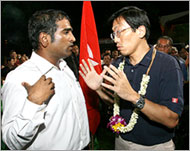Polls open in Singapore
Singaporeans have begun voting in a general election that is widely expected to return Lee Hsien Loong, the prime minister, to power.

Saturday’s parliamentary election is the first real test of popularity for Lee, 54, since he took over as prime minister from Goh Chok Tong in August 2004 in a planned leadership transition.
Lee’s People’s Action Party (PAP) was denied a walkover victory for the first time in 18 years when opposition parties fielded candidates for 47 of the 84 seats. But analysts have no doubt that the PAP will win a comfortable majority again.
Voting is compulsory and about 1.2 million Singaporeans are eligible to vote. Polling booths opened at 8am (2300 GMT Friday) and will close at 8pm. The first results are expected around two hours afterwards.
Some polling stations opened minutes before schedule to allow voters to shelter from an early morning downpour, state-owned television said.
Singapore bans election surveys and exit polls, making it difficult to gauge how much popular support there is for Lee and for the opposition parties.
Large crowds
In recent days, opposition rallies have attracted crowds of several thousand people, but that may not necessarily translate into votes as some participants come from wards where the PAP is unopposed.
The nine days of campaigning, which ended on Friday, were dominated by debates about the widening income gap, rising medical costs, job cuts, and calls for a less authoritarian political system.
 |
|
Opposition parties have never |
The PAP has dominated politics since independence from Britain in 1965 and won 82 of the 84 seats in the last election.
Analysts say that Lee – the eldest son of Lee Kuan Yew, a former prime minister – needs at least 61% of the vote and to lose no more than four seats to have a strong mandate.
That was the outcome that his predecessor, Goh Chok Tong, got in the PAP’s worst electoral outcome in 1991.
If the PAP wins less than 60% of the votes cast or loses one of the multi-member wards where as many as six candidates run together, it would be a “major psychological blow”, said Song Seng Wun, an economist at CIMB-GK Research.
The PAP, which is fielding 24 new candidates, is campaigning on boosting the country’s $118 billion economy and helping the wealthy city-state’s poor and elderly.
Singapore’s tiny opposition parties have never won more than four seats in parliament.